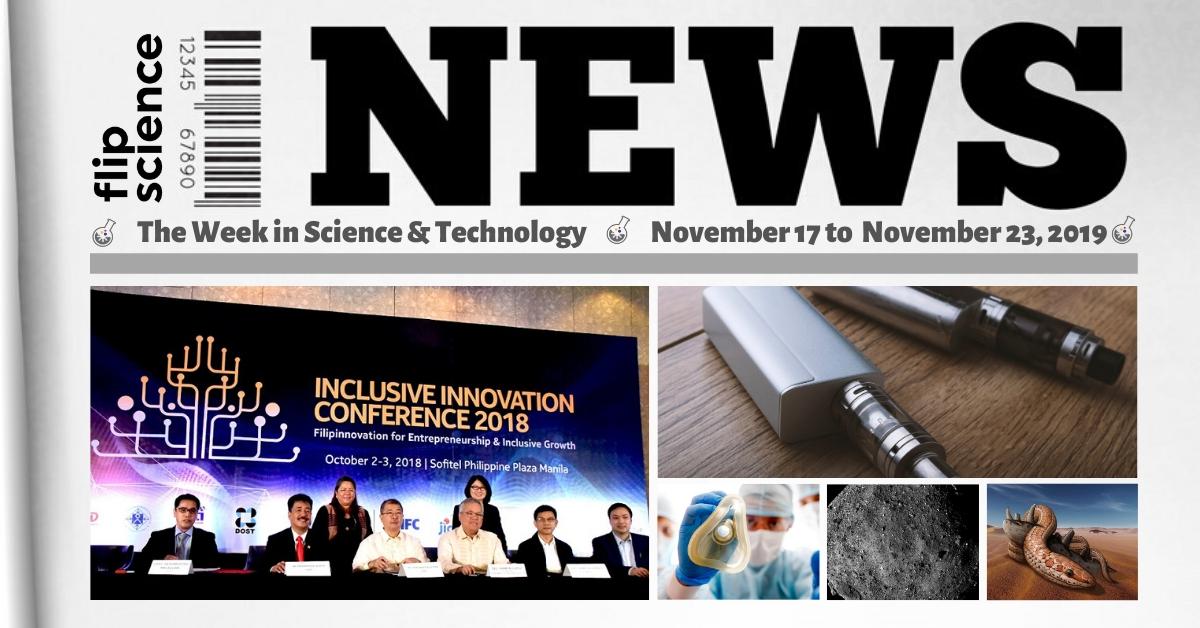ICYMI: Science and technology updates from November 17 to 23, 2019.
Duterte bans public vaping
Last November 19, President Rodrigo Duterte announced a ban on the use of e-cigarettes in public areas. This declaration came on the heels of the country’s first confirmed case of e-cigarette or vape-associated lung injury (EVALI): a 16-year old-girl from Visayas.
In relation, two senators have said that they would work towards passing bills to “highly regulate” e-cigarette sales in the Philippines. According to Senate Ways and Means Committee chair Sen. Pia Cayetano, the Senate will continue to tackle SB 1074, which would impose higher taxes on e-cigarettes and alcohol to finance universal health care. Meanwhile, Sen. Sherwin Gatchalian also expressed plans to file a separate bill for regulating the local e-cigarette industry.
DOST-PCIEERD kicks off TBI 4.0 Program to support local startups
At the 3rd National TBI Summit held last November 20 in Pasig City, stakeholders formally signed the Memorandum of Understanding for the TBI 4.0 Partnership.
According to the Department of Science and Technology’s Philippine Council for Industry, Energy and Emerging Technology Research and Development (DOST-PCIEERD), the TBI 4.0 program funds eight technology business incubators (TBIs), which will lead in assessing and co-developing incubation programs, as well as capacity building and co-incubation arrangements. QBO Innovation Hub serves as the program lead, partnering with the University of the Philippines’ UPSCALE Innovation Hub, CDO BITES of the University of Science and Technology in Southern Philippines, Ideya of Mindanao State University–Iligan Institute of Technology, Batangas State University’s Center for Technopreneurship and Innovation (CTI), Green Technology Business Incubation (GTBI) of West Visayas State University, De La Salle University’s Animo Labs, and the University of the Philippines Los Baños’ Startup Innovation and Business Opportunity Linkage Labs (SIBOL).
PCIEERD launched the TBI 4.0 Program with the aim of partnering and collaborating with incubators and accelerators from other countries to support Philippine startups. Since the inception of DOST’s TBI program in 2009, the agency has supported and worked with 45 incubators, 320 startups, and over 110 full-blown companies, resulting in more than 1,200 jobs and over 280 million private investments.
A sweet find: Scientists detect bio-essential sugars in carbon-rich meteorites
A recently published study in the Proceedings of the National Academy of Sciences revealed a rather sweet scientific discovery. An international team of researchers found ribose and other sugars essential to life (such as arabinose and xylose) in the carbon-rich meteorites NWA 801 (type CR2) and Murchison (type CM2). This new find supports the hypothesis that some of the basic ingredients for life can come from chemical reactions in asteroids. Thus, it’s possible that meteorites could have brought some of life’s building blocks to Earth millions of years ago.
Humans put into suspended animation in groundbreaking trial
In a pioneering U.S. trial, doctors have placed human patients in a state of suspended animation (formally known as emergency preservation and resuscitation, or EPR). The process, which “involves rapidly cooling the brain to less than 10C by replacing the patient’s blood with ice-cold saline solution,” is intended to buy more time for medical professionals to deliver life-saving treatment and care to patients with “catastrophic” injuries and a very low chance of survival. The trial, which will run until the end of 2019, also aims to reduce the irreparable brain damage that survivors are often left with.
Study sheds new light on prehistoric desert snake with legs
Named after a biblical snake, Najash rionegrina was an ancient snake from 95 million years ago. First discovered in 2006, it was unique in that it was a desert snake (not an aquatic one) with hind legs. Unfortunately, initial descriptions of N. rionegrina were based on a fragmented skull, meaning researchers were unsure about the characteristics of this prehistoric reptile’s head. However, a recently published study in the journal Science Advances revealed a new analysis of N. rionegrina based on what has been described as a “beautifully preserved” skull.

The newly studied fossils also reveal fascinating characteristics that were previously unknown about prehistoric snakes.
References:
- https://news.abs-cbn.com/news/11/22/19/senators-eye-law-highly-regulating-e-cigarettes-amid-duterte-vaping-ban
- DOST-PCIEERD official press release
- https://phys.org/news/2019-11-sugars-meteorites-clues-life.html
- https://www.theguardian.com/science/2019/nov/20/humans-put-into-suspended-animation-for-first-time
- https://www.livescience.com/snake-with-legs-skull.html







